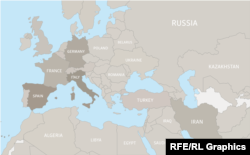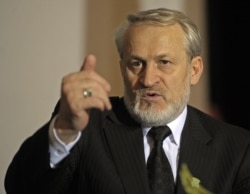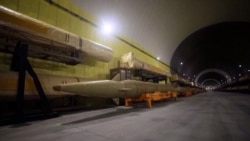News
- By RFE/RL
COVID-19: Putin Tells Officials To 'Get Ready' For Fight; Iran Urges IMF To Move On Emergency Loan
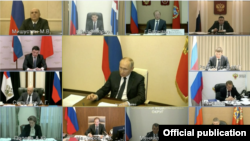
The global death toll from the coronavirus is more than 87,000 with over 1.4 million infections confirmed, causing mass disruptions as governments continue to try to slow the spread of the new respiratory illness.
Here's a roundup of COVID-19 developments in RFE/RL's broadcast regions.
Russia
Russian President Vladimir Putin has told cabinet ministers and regional heads to prepare to battle the coronavirus as he outlined steps being taken to counter the outbreak.
"Right now we need to get ready to fight for the life of each individual in every region," Putin said during a video conference from his residence outside Moscow on April 8 during which he outlined measures being implemented to counter the growing outbreak in the country.
Russia has more than 8,670 officially confirmed coronavirus infections and at least 63 fatalities.
However, critics have cast doubt over the veracity of the figures, saying the actual toll could be much higher.
Among the steps publicized by Putin during his address was extra pay for medical personnel and the freeing up of 10 billion rubles ($133 million) from the federal budget to be disbursed among the country's more than 80 administrative regions.
In addition, he said that medical personnel who are in direct contact with coronavirus patients would be in line for an additional bonus.
Addressing the economy, Putin said that there was "practically no such thing as a total shutdown of business," despite the obstacles and restrictions being faced.
"We must realize what kind of damage and destructive consequences this can bring about," he said.
Putin also told the nation that he realized it is difficult to "remain inside four walls all the time."
"But there is no choice," he said. "One has to make it through self-isolation," he told chiefs of Russia's regions, which are mostly under strict lockdown.
Iran
Iranian President Hassan Rohani has urged the International Monetary Fund (IMF) to provide Tehran a multibillion-dollar emergency loan it had requested to combat the coronavirus outbreak.
The epidemic has further damaged Iran's economy, already battered by U.S. sanctions that were reimposed after Washington in 2018 withdrew from a landmark deal between Tehran and world powers to curb the country's nuclear program.
Tehran, as well as several countries, the United Nations, some U.S. lawmakers, and human rights groups have urged the United States to ease the sanctions to help Iran respond more effectively to the virus.
Live Map: The Spread Of The Coronavirus
The outbreak has officially infected more than 62,500 people and killed over 3,800 in the country. Iranian officials have been criticized for their slow initial response to the pandemic, and experts have been skeptical about the veracity of official figures released by the authorities, who keep a tight lid on the media.
"We are a member of the IMF.... There should be no discrimination in giving loans," Rohani said in a televised cabinet meeting on April 8.
"If they do not act on their duties in this difficult situation, the world will judge them in a different way," he added.
Last month, the Central Bank of Iran asked the IMF for $5 billion from its Rapid Financing Initiative to help to fight the pandemic in one of the hardest-hit countries in the world.
An IMF official was quoted as saying the Washington-based lender was in dialogue with Iranian officials over the request.
Iran has not received assistance from the IMF since a "standby credit" issued between 1960 and 1962, according to the fund's data.
U.S. President Donald Trump has offered some humanitarian assistance, but Iranian officials have rejected the offer, saying Washington should instead lift the sanctions, which Rohani on April 8 equated to “economic and medical terrorism.”
Medicines and medical equipment are technically exempt from the U.S. sanctions but purchases are frequently blocked by the unwillingness of banks to process transactions for fear of incurring large penalties in the United States.
In one of the few instances of aid, Britain, France, and Germany used a special trading mechanism for the first time on March 31 to send medical supplies to Iran in a way that does not violate the sanctions.
The three countries sent supplies via Instex, the mechanism set up more than a year ago to allow legitimate humanitarian trade with Iran.
On April 7, Iran's parliament reconvened for the first time since the coronavirus outbreak forced it to close, and rejected an emergency bill calling for a one-month nationwide lockdown.
More than two-thirds of the legislature's 290 members gathered in the absence of speaker Ali Larijani, who tested positive for the virus last week.
During the session, deputy speaker Massud Pezeshkian criticized the Rohani administration for "not taking the outbreak seriously."
Reporters Without Borders (RSF) on April 7 condemned the detention of journalist and workers’ rights defender Amir Chamani in the northwestern city of Tabriz after he posted tweets about the health situation in Iran’s prisons and protests by inmates.
The Paris-based media freedom watchdog quoted Chamani’s family as saying he was detained on April 2 after being summoned by the cyberpolice.
The authorities have given no reason for the arrest of Chamani, who was transferred to a detention center run by the intelligence department of the Islamic Revolutionary Guards Corps, according to RSF.
Romania
Romania has confirmed another 344 cases of COVID-19 to reach 4,761, with 18 more fatalities that brought the toll to 215, the country's coronavirus task force said on April 7, amid renewed calls for a sustained increase in the number of tests.
More than 700 of those infected are health-care workers.
The first fatality among medical staff was reported on April 8 -- an ambulance paramedic from the northeastern city of Suceava who had reportedly kept working without being tested for days, although his health was deteriorating rapidly.
Suceava is the epicenter of the outbreak in Romania and has been under lockdown since last week.
The first coronavirus death was registered in Romania on March 22.
An additional 631 Romanians tested positive for COVID-19 abroad, most of them -- 412 -- in Italy, the world's hardest-hit country. Some 37 Romanians have died so far in Italy, Britain, France, Spain, and Germany.
The country has been under a state of emergency since March 16, and President Klaus Iohannis on April 6 announced his intention to extend it by one month, while the government decided to postpone local elections that should have been held in early summer.
The Suceava paramedic's death adds to worries about how Romania's system is coping with the epidemic. Doctors and nurses have spoken out in recent weeks over insufficient equipment for those treating COVID-19 cases, and many medical staff have resigned over the shortages as well as mismanagement and fatigue.
Romanian platform for online activism DeClic has launched an Internet campaign urging the authorities to speed up the testing under the slogan "Mr. [Prime Minister Ludovic] Orban, don't toy with our lives."
Romania, a country of 19.5 million, has tested 47,207 people for coronavirus. By comparison, fellow EU member the Czech Republic has tested almost 99,000 people out of a total of 10.5 million. The Czech death toll stands at 99, less than half of Romania's.
With reporting by RFE/RL's Romanian Service, digi24.ro, g4.ro, Reuters, and hotnews.ro
North Caucasus
A former top official of the independent Chechen Republic of Ichkeria, Akhmed Zakayev, has been hospitalized in London with coronavirus symptoms.
Zakayev's relatives told RFE/RL that the exiled former member of the Chechen separatist government was hospitalized on April 6 after he experienced difficulties breathing.
The relatives added that three days prior to his hospitalization, other family members were experiencing COVID-19 symptoms, such as fever and cough, as well.
Medical officials asked Zakayev's relatives to sign a consent paper to use artificial respiration during his treatment.
Zakayev, 60, served as culture minister, deputy prime minister, prime minister, and foreign minister in Chechnya's separatist government.
He and his immediate family members have been residing in exile in London since 2002.
He is wanted in Russia for alleged terrorism, which he and his supporters deny.
With reporting by RFE/RL's North Caucasus and Romanian services and Radio Farda, Reuters, TASS, Interfax, AFP, Digi24.ro, G4.ro, and Hotnews.ro
More News
- By RFE/RL
US House Panel Backs Tougher Iran Measures, But Divisions Persist

US lawmakers and experts at a House Foreign Affairs Committee hearing underscored a rare bipartisan consensus -- preventing Iran from acquiring nuclear weapons as a top priority.
However, divisions remain over how far Washington should go in applying pressure versus pursuing diplomacy.
Republican lawmakers strongly supported the Donald Trump administration’s decision to reinstate the “maximum pressure” campaign that defined his Iran policy during his first term as US president.
“The maximum pressure campaign devastated Iran’s economy and denied it critical resources. A nuclear Iran is not an option,” Subcommittee Chairman Mike Lawler (Republican-New York) said on April 1.
Democratic lawmakers also acknowledged the threat posed by Iran but stressed the importance of diplomacy.
“There is bipartisan understanding of the danger posed by Iran as the world’s foremost state sponsor of terrorism. We must combine pressure with diplomatic engagement,” Ranking Member Gregory Meeks (Democratic-New York) said.
Three expert witnesses provided testimony on the challenges posed by Iran and the potential consequences of US strategies.
Norman Roule, a senior advisor at the Center for Strategic and International Studies, warned that Iran is advancing its nuclear program and could produce a weapon within months if left unchecked.
“Iran is closer than ever to producing a nuclear weapon,” Roule warned, adding that military strikes could only delay its program. He called for a comprehensive approach that combines sanctions, military readiness, and diplomacy.
Claire Jungman of United Against Nuclear Iran (UANI) highlighted the economic toll that sanctions have taken on the country, noting that its economy remains fragile due to inflation and currency devaluation.
She stressed the importance of targeting Iran’s oil trade with China in violation of US sanctions and leveraging its economic vulnerabilities to weaken its support for regional proxies like the US-designated Lebanese terrorist group Hezbollah.
Dana Stroul of The Washington Institute for Near East Policy noted that military strikes could escalate into broader conflict and urged Washington to pair pressure tactics with robust diplomacy.
She added that “the pillars of Iran’s security strategy”, including its nuclear program, proxy network, and arsenal of missiles and drones, are “more vulnerable today than ever.”
Trump has threatened to bomb Iran if it fails to reach a deal with Washington. Tehran has dismissed the threat, describing it as an “affront” to peace and security.
Iran last week delivered a formal response to Trump’s letter proposing direct talks to reach a new nuclear deal. Tehran has dismissed direct negotiations as long as the “maximum pressure” campaign is in effect.
Axios reports that the White House is “seriously considering” Iran’s proposal for indirect talks while boosting its military presence in the Middle East.
Addressing Iranian Supreme Leader Ayatollah Ali Khamenei, Committee Chairman Brian Mast (Republican-Florida) said Trump “will work with you to peacefully end” Iran’s nuclear and ballistic missile programs.
“Or, President Trump will destroy your nuclear weapons and ballistic missile program. You get to choose the remedy,” he said.
Iran maintains its nuclear program is peaceful, but there are growing calls in Iran to weaponize it as a form of deterrence against the United States and Israel.
Ukraine's Partners To Discuss Foreign Troop Deployment, Zelenskyy Says
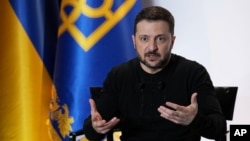
Western military leaders will discuss the possible deployment of troops to Ukraine who would monitor a potential cease-fire in the conflict with Russian and be part of the country’s new security structure, Ukrainian President Volodymyr Zelenskyy said in his nightly video address.
“This is our starting point: the Ukrainian army must be strong enough, and on this foundation, the entire security architecture is built,” Zelenskyy said. “A meeting will take place in just a few days -- on Friday (April 4) -- with representatives of our partner states -- these will be military representatives.”
Zelenskyy met in Kyiv on April 1 with outgoing German Foreign Minister Annalena Baerbock, saying that a "narrow circle of countries" is willing to send contingents.
The Ukrainian leader told a joint news conference with Baerbock that he was awaiting "more concrete" answers from allies on their readiness to participate.
France and Britain have expressed a willingness to send troops as part of a so-called coalition of the willing to monitor a potential cease-fire. But Russia has strongly opposed any deployment of foreign troops in Ukraine.
In his video address, Zelenskyy also said Ukraine has now shared “all the necessary information regarding Russia’s violations in the energy sector” with its US partners. He said there were strikes on April 1 in Kherson, including a Russian drone that targeted an energy facility and equipment “entirely deliberately and purposefully” and part of the city was left without electricity.
“We insist that every such violation must be documented and receive a response from our partners,” he said. “It is precisely these small details that add up to Russia’s major delays in the diplomatic process."
Zelenskyy referred to an agreement between Kyiv and Moscow not to strike each other's energy facilities. The agreement was announced by the White House on March 25 along with a cease-fire to allow navigation on the Black Sea.
Kyiv said the agreement on energy facilities would take effect immediately. Moscow, however, has said it would follow the partial lifting of sanctions pertaining to Russian companies and banks involved in the international food trade.
Germany announced a commitment to an additional 130 million euros ($140 million) in humanitarian aid and stabilization funds during Baerbock’s visit. The package will bring German assistance since the start of the Russian invasion to Ukraine to 7 billion euros, he said.
Zelenskyy thanked Germany for ensuring that its support for Ukraine remains predictable and systematic. The stability of support is one of the key factors in defending against Russian aggression, he said.
"It is the interruptions in supplies, disagreements between partners, and all signs of instability that [Russian President Vladimir] Putin is highly counting on,” he said.
Russian troops launched a massive drone strike on Kharkiv on the night of April 1. Mayor Ihor Terekhov said 13 Shahed drones hit in the city, and at least eight people were injured.
"The consequences included the fire of two industrial buildings, and more than 10 private sector houses were damaged nearby," Terekhov said.
A Russian strike earlier on April 1 in the Zaporizhzhya region hit civilian infrastructure, killing one person, regional Governor Ivan Fedorov said.
- By RFE/RL
US Military Orders Second Aircraft Carrier Group To Middle East

The US military has announced a second aircraft carrier group will deploy to the Middle East to respond to regional threats to stability as US forces continue to hit Iran-linked Huthi fighters in Yemen from its ships in the Red Sea.
Pentagon spokesman Sean Parnell said in a statement on April 1 that the aircraft carrier Carl Vinson will join the aircraft carrier Harry S. Truman in the Middle East "to continue promoting regional stability, deter aggression, and protect the free flow of commerce in the region."
The Carl Vinson has been ordered to arrive from the Indo-Pacific following completion of a scheduled exercise, Parnell said without saying when it would get there.
The announcement comes as US forces hit Huthi fighters in Yemen with near-daily air strikes in a campaign aimed at ending the threat they pose to civilian shipping and military vessels in the region.
"The United States and its partners remain committed to regional security in the CENTCOM AOR (area of responsibility) and are prepared to respond to any state or non-state actor seeking to broaden or escalate conflict in the region," Parnell said. CENTCOM is the US military command responsible for the region.
Parnell added that Secretary of Defense Pete Hegseth continues to make clear that “should Iran or its proxies threaten American personnel and interests in the region, the United States will take decisive action to defend our people.”
The Huthis, which the United States has designated as a terrorist group, began targeting shipping in the Red Sea and Gulf of Aden after the start of the Gaza war in 2023, claiming solidarity with Palestinians.
Huthi attacks have prevented ships from passing through the Suez Canal, forcing many companies to send their goods on a costly detour around the tip of southern Africa that takes considerably longer.
President Donald Trump vowed on March 31 that strikes on the Huthis will continue until they are no longer a threat to shipping.
"The choice for the Huthis is clear: Stop shooting at US ships, and we will stop shooting at you. Otherwise, we have only just begun, and the real pain is yet to come, for both the Huthis and their sponsors in Iran," Trump said on his Truth Social platform.
Trump added that the Huthis had been "decimated" by "relentless" strikes since large-scale air strikes began on March 15, saying that US forces "hit them every day and night -- Harder and harder."
The large-scale air strikes began after Trump warned the Huthis that "hell will rain down upon you" if they did not stop their extremist actions, including missile launches against Israel.
Trump has also said that "there will be bombing" if Iran does not reach a deal on its nuclear program.
Huthi officials said at least 12 civilians were killed and another nine injured in the US attacks, but the claims could not be independently confirmed. The officials vowed revenge without specifying how it would carry it out.
Secretary of State Marco Rubio on March 16 said the attacks were “a message to Iran” to stop supporting the Huthis, and Hegseth said Iran "is on notice" that Huthi attacks on American ships, aircraft, and troops will not be tolerated.
With reporting by AFP
EU Lawmakers Debate Support For RFE/RL Amid US Funding Freeze
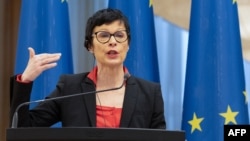
European Commissioner for Enlargement Marta Kos has emphasized the “need to protect Radio Free Europe/Radio Liberty (RFE/RL),” warning that "if we don’t, we hand a gift to autocrats the world over."
Her remarks came during a debate in the European Parliament plenary in Strasbourg on April 1 that focused on safeguarding access to democratic media, including RFE/RL.
The debate was initiated in response to an executive order signed by US President Donald Trump on March 14, which reduced the size of the US Agency for Global Media (USAGM), the body overseeing RFE/RL.
Shortly afterward, Kari Lake, a senior adviser to the USAGM CEO, issued a letter stating that the Congress-approved grant funding the broadcaster had been terminated.
While the grant termination has since been rescinded, the USAGM has not sent any of the congressionally appropriated funds, prompting RFE/RL to furlough some of its staff on April 1.
Kos, speaking on behalf of the EU foreign policy chief Kaja Kallas, said that “the European Union needs to be a refuge for independent media, including from Russia and Belarus, so they can continue their work; holding their political and business elites to account and exposing corruption.”
While the commissioner refrained from speaking about the potential of the EU stepping in to fund the media organization, several members of the European Parliament did mention the idea.
Stormy Discussion
Sebastiao Bugalho, a Portuguese member of the largest group in the chamber, the center-right European People’s Party, said that “we will pay the price and shoulder the burden.”
Lithuanian lawmaker Virginijus Sinkevicius from the Greens underlined that “we must ensure that RFE/RL has access to long-term and stable funding, including from the EU.”
Alexandr Vondra, who was a prominent dissident in communist Czechoslovakia and is now a Czech MEP from the right-wing European Conservatives and Reformists, said that the radio helped spread information in repressive countries such as Iran, Belarus, and Russia, and called on the European Union to contribute to the station’s finding.
“Let us be open to finance [RFE/RL] also from EU money and find agreement on what form,” he said.
The one-hour debate became rather stormy at times with lawmakers shouting at each other in between speeches.
Several members from populist groups in the Strasbourg chamber spoke against potentially using EU money to finance the broadcaster.
Mary Khan, an MEP from the far-right Alternative for Germany party, said that RFE/RL “can finance itself” and added that “media should not be financed by European institutions.”
Slovak MEP Milan Uhrik, who belongs to the same Europe of Sovereign Nations Group as Khan, said that the EU should instead help farmers in Slovakia battling foot-and-mouth disease among its cattle, adding that “your independent media is the absolute opposite of independent media.”
Julien Sanchez, a French parliamentarian belonging to the Patriots for Europe, another populist right-wing fraction, said that the chamber was “hypocritical” in talking about this situation and “interfering with the situation in the United States.”
The debate will have no resolution to be voted on during this plenary session, which ends on April 3, but this could come at a later stage as several European parliamentary officials told RFE/RL that the house will continue to monitor the situation.
Fourth Missing US Soldier's Body Recovered In Lithuania
The body of a fourth missing US soldier has been recovered near Pabrade, Lithuania, the US Army said in a statement on April 1.
Recovery operations, bolstered by international cooperation and advanced technology, lasted for several days after a military vehicle with four US soldiers aboard sank in a bog area on March 25.
The bodies of the first three soldiers from the US Army's 1st Armored Brigade Combat Team, 3rd Infantry Division, and their M88A2 Hercules armored recovery vehicle had been retrieved a day earlier.
"This past week has been devastating. Today, our hearts bear the weight of an unbearable pain with the loss of our final Dogface Soldier," said Major General Christopher Norrie, using an affectionate nickname for a US infantryman. "Though we have received some closure, the world is darker without them."
The recovery mission had intensified in the last 24 hours with the arrival of specialized personnel and equipment. Rescue dogs and two advanced drone systems, including one equipped with ground-penetrating radar, had operated on the site to enhance search capabilities.
Hundreds of soldiers from the 3rd Infantry Division, alongside US Navy divers, Lithuania's armed forces, Polish engineers, Estonian military police, multinational civilian agencies, and technical experts from the US Army Corps of Engineers, were actively engaged in the recovery.
The names of the deceased are being withheld pending notification of their families.
Investigations into the tragedy are under way. Authorities are examining the circumstances that led to the incident, including the terrain, weather conditions, and the state of the vehicle.
The missing vehicle and troops had triggered a massive multinational rescue effort, and US Major General Curtis Taylor, commanding general of the 1st Armored Division, expressed thanks to everyone who contributed to the recovery operation.
"We cannot thank our Allies and fellow service members enough, especially Lithuanians, who spared no resource in support of this mission," he said. "Together, we delivered on our promise to never leave a fallen comrade."
Lithuania, a NATO and EU member, hosts more than 1,000 US troops stationed in the Baltic nation on a rotational basis.
Tate Brothers Under Judicial Supervision For 60 More Days In Romania

The Romanian Directorate for Investigating Organized Crime and Terrorism (DIICOT) has extended supervision measures for another 60 days against against Andrew Tate and his brother, Tristan, who are awaiting trial on charges of human trafficking, rape, and forming a criminal gang to sexually exploit women.
The brothers appeared at DIICOT's headquarters on April 1, where judicial sources confirmed the extension to RFE/RL.
The measures mean the brothers must report once a month, or whenever summoned, to the Voluntari Police Station near Bucharest, which monitors their compliance with their legal restrictions. They also are required to sign procedural documents as part of the process.
The measures have been tweaked and extended several times already, and may be further extended or adjusted as necessary in the future, according to Romanian law.
Andrew Tate, a prominent social media influencer with millions of Facebook followers, has repeatedly declared his innocence.
Shortly after being informed of the extension, the brothers left Romania on a private jet and headed to Dubai.
DIICOT lifted a travel ban on the brothers in February, allowing them to travel to Florida.
Upon their return to Romania on March 24, the brothers complied with the requirement to show up at a police station and sign judicial supervision documents. The governor of Florida later stated that the Tate brothers were "not welcome" in the state.
In Romania, Andrew and Tristan Tate are accused of recruiting women to produce pornographic content under coercion. The charges involve forming an organized criminal group, human trafficking, child trafficking, sexual acts with a minor, and money laundering.
Prosecutors allege that the brothers, along with four accomplices, recruited 34 women, transported them to various locations, and forced them to create explicit content, which was then distributed for profit on adult platforms.
The alleged financial gain from these activities includes $2.8 million and 887,000 crypto tokens, the value of which was not specified.
In a separate case, the brothers face charges of forming an organized criminal group and human trafficking. Additionally, Andrew Tate is accused of rape, while Tristan Tate faces accusations of inciting violence.
Beyond Romania, the Tate brothers are also being investigated in the United Kingdom for rape and human trafficking. A British court has confiscated assets worth over 2 million British pounds due to unpaid taxes.
In the United States, they face a civil lawsuit filed by a woman alleging that the brothers tried to coerce her into prostitution in Romania and later defamed her when she reported the incident to Romanian authorities. The brothers have denied all allegations and continue to assert their innocence.
Andrew Tate maintains that being one of the most famous people on the planet naturally attracts scrutiny from every country.
After one of his visits to the Voluntari Police Station, Tate again dismissed the allegations, saying "the charges against us will not have any outcome."
The Tate brothers remain vocal in proclaiming their innocence, expressing confidence that they will ultimately prove the charges baseless.
Dodik Meets With Putin As Visit To Moscow Riles Bosnian Lawmakers

Bosnian Serb leader Milorad Dodik met with Russian President Vladimir Putin during a surprise visit to Moscow as lawmakers back home warned the nationalist leader was putting Bosnia-Herzegovina's EU drive at risk.
Dodik, who left Bosnia even though he's the target of an international arrest warrant over accusations that he flouted the Balkan country's constitution, posted a video of himself on social media on April 1 in front of the Tomb of the Unknown Soldier along the wall of the Kremlin.
"I start every time I stay here with a visit to the Tomb of the Unknown Soldier to pay my respects to the 28 million Russians who died in World War II," Dodik said in the video posted on X shortly after he arrived in Moscow.
He provided no agenda for his visit but said he would "be here again on May 9 at the invitation of the president of the Russian Federation, Vladimir Putin, to mark the 80th anniversary of the victory over fascism."
Hours later, Dodik said on the X social network that he had his "26th meeting" with the Russian president, stressing that "Putin knows the details, the overall situation that is happening" in Republika Srpska" and "is interested in everything" that ordinary residents of the entity are concerned about.
Dodik's statement was accompanied with a video showing him shaking hands with Putin before the talks.
"Russia is a very important country for Republika Srpska in the [UN] Security Council, and it has always been objective. Russia is the guarantor of the peace agreement and Putin said that at the meeting," Dodik's statement said, adding that Russia will advocate for the end of the work of international institutions in Republika Srpska.
Dodik, who is the president of Republika Srpska, is currently under US and UK sanctionsfor actions Western governments say are aimed at the secession of Republika Srpska from Bosnia.
The Court of Bosnia-Herzegovina on March 27 requested the international arrest warrant after Dodik failed to respond to a summons from the Prosecutor-General's Office on suspicion that he committed the criminal offense of attacking the constitutional order of Bosnia. The move came after the court issued a national arrest warrant on March 18.
Bosnian Foreign Minister Elemdin Konakovic warned after meeting OSCE Secretary General Feridun Sinirlioglu on April 1 that Dodik's moves "are trampling the interests of the state," especially Bosnia's path to European Union membership.
Sinirlioglu warned that Dodik's disregard for Bosnia's constitution could lead to serious internal consequences for the country and "also lead to far-reaching consequences for peace and stability in the region."
In his video from Moscow, Dodik spoke of the suffering of Russians and Serbs in the defeat of fascism.
"Some are trying to revise history. It is impossible to do so, but those who want to do so are openly trying to distort historical facts," he said.
"But the historical fact about the suffering of the Russian and Serbian people, and the Jewish people during World War II is simply impossible to change."
Dodik also spoke highly of Putin, whom he has met several times since the beginning of the Russian invasion of Ukraine in February 2022 and described as "the historic leader of the Russian people."
He added that Putin has welcomed "another counterpart who is important to him in the fight against the globalist elite, and that is [US] President [Donald] Trump."
The Bosnian court requested the international arrest warrant for Dodik and for Nenad Stevandic, speaker of the Republika Srpska Parliament, on suspicion of the same crime -- attacking the constitutional order of Bosnia.
Dodik announced his arrival in Moscow on March 29 but did not provide details.
Republika Srpska in mid-March adopted a draft of a new constitution that would redefine the Serb entity as a state of the Serbian people, grant it the right to self-determination, and establish its own army.
These provisions would be directly in conflict with the Bosnian Constitution and the Dayton peace accords, which established Republika Srpska as one of Bosnia's two entities.
Throughout his tenure as president of Republika Srpska, Dodik has faced criticism for authoritarian tendencies, undermining democratic institutions, and fostering a culture of political patronage.
Supporters argue that he has brought stability and development to the entity, while opponents charge that his leadership has deepened divisions among the country's ethnic communities and eroded the state's institutional integrity.
With reporting by AFP
Germany's Baerbock Warns Of Putin Stalling Tactics During Kyiv Visit
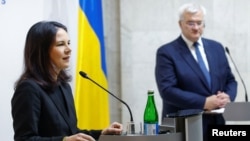
German Foreign Minister Annalena Baerbock, in Kyiv on a surprise visit, has warned against falling for Russia's stalling tactics in peace negotiations to end the war in Ukraine.
The outgoing German diplomat, on her ninth trip to Ukraine since the Kremlin launched its full-scale invasion in February 2022, said she believes Kyiv is ready to sign a peace deal amid intensifying negotiations led by the United States.
"Ukraine is ready for an immediate cease-fire. It is Putin who is playing for time, does not want peace, and is continuing his war of aggression, which is a violation of international law," Baerbock said in a statement shared by her ministry.
"He is feigning a willingness to negotiate, but not deviating an inch from his goals," she said.
US President Donald Trump has threatened Russia with new tariffs on oil products if Moscow blocks his cease-fire initiatives, and Baerbock said a meeting of NATO foreign ministers in Brussels this week should reinforce that message
"At the upcoming meeting of NATO foreign ministers, we will make it clear to the American side that we should not engage with Putin's stalling tactics," said Baerbock, who is unlikely to be part of Germany's incoming coalition government.
"Because suggesting peace is not peace," she added.
While Trump raised his ire toward Russia, the Kremlin appeared to brush off concerns the comments would hinder peace talks.
Putin's spokesman, Dmitry Peskov, told journalists on March 31 that Moscow continues to work with Washington on "the implementation of some ideas related to the Ukrainian settlement."
Trump's angry comments were directed solely at Russia.
He also said Ukrainian leader Volodymyr Zelenskyy faces "big, big problems" if he doesn't sign a key minerals deal with Washington that the two sides have been working on for weeks.
"He's trying to back out of the rare earth deal, and if he does that he's got some problems, big, big problems," Trump told reporters on March 30 in reference to the Ukrainian president.
"We made a deal on rare earth. And now he's saying, well you know, I want to renegotiate the deal."
On March 28, the Ukrainian government said it was still considering a draft agreement from the United States on the country's rare earth minerals amid media reports Washington had changed the terms of the deal several times.
Ukrainian Economy Minister Yulia Svyrydenko announced at a government meeting that Kyiv was forming its position on the agreement, but lawmakers would only state their stance once there was consensus. Before then, she said, public discussion would be harmful.
Ukraine possesses significant deposits of critical minerals, including rare earths, although their exact size remains uncertain. Rare earth minerals are highly valued for their use in defense technologies, as well as in devices such as computers, smartphones, and batteries.
Ukraine and the United States earlier this month agreed to conclude a comprehensive agreement for developing Ukraine's critical mineral resources. Efforts to seal the deal had earlier fallen apart on February 28 after a heated exchange between Trump and Zelenskyy at the White House.
Meanwhile, earlier on March 30, Trump said he would impose secondary tariffs of 25-50 percent on all Russian oil if he feels President Vladimir Putin is blocking his efforts to end the war in Ukraine.
Trump said over the weekend during a phone interview with NBC that he was "very angry" and "pissed off" when Putin called for a transitional government to be put in place in Ukraine, which could effectively push out Ukrainian President Volodymyr Zelenskyy.
"If Russia and I are unable to make a deal on stopping the bloodshed in Ukraine, and if I think it was Russia's fault -- which it might not be -- but if I think it was Russia's fault, I am going to put secondary tariffs on oil, on all oil coming out of Russia," Trump said.
"That would be that if you buy oil from Russia, you can't do business in the United States," Trump said. "There will be a 25 percent tariff on all oil, a 25- to 50-point tariff on all oil."
Trump added that the trade measures would be put in place within a month if no cease-fire agreement is reached.
The highly sensitive diplomatic juncture comes after the White House announced on March 25 that both Russia and Ukraine agreed to a cease-fire and to allow navigation in Black Sea, as well an agreement to not strike each other energy facilities.
Kyiv says that it would take effect immediately and Moscow has stated that it would follow the partial lifting of sanctions pertaining to Russian companies and banks involved in the international food trade.
Ukraine's Foreign Minister Andriy Sybiha on April 1 accused Russia of again striking energy infrastructure, saying a Russian attack damaged an energy facility in the frontline city of Kherson, cutting power to 45,000 residents.
Russian officials in turn accused Ukraine of using drones to strike electricity substations in part of the Russian-controlled Zaporizhzhya region in southeast Ukraine and in Russia's southern Belgorod region.
Tougher Tone Toward Putin
The comments by Trump mark a shift from the softer approach the White House had taken toward Russia since the US president made ending the war in Ukraine a top foreign policy priority. They also come after he had previously criticized Zelenskyy, saying he was "sick" of his handling of the war and called him a "dictator without elections."
Trump told NBC that he will speak with Putin during this week.
Amid the US-led diplomatic efforts to reach a cease-fire deal, Russia has been pounding the city of Ukrainian city of Kharkiv.
Air strikes on the northeastern Ukrainian city early on April 1 injured three people and sparked fires at several industrial buildings and damaged two kindergartens, officials said.
A day earlier, Kyiv accused Moscow of a "war crime" after Russian drones struck a military hospital.
The strike hit Kharkiv, Ukraine's second-largest city, as part of an attack that also hit a shopping center, apartment blocks, and other targets, killing two people, according to authorities.
The Ukrainian military's general staff accused Russia of "violating the norms of international humanitarian law" in the attack, which they denounced as "deliberate, targeted shelling."
In a report on April 1, the general staff said Russia has lost about 916,770 of its military personnel since launching its full-scale invasion in February 2022, including 1,540 in the last 24 hours.
The figures were not independently verified.
An analysis by the International Institute for Strategic Studies estimated in mid-February that at least 172,000 Russian soldiers have been killed and 611,000 wounded, more than half of whom were severely wounded, unable to fight again.
For Ukraine, at least 46,000 soldiers have been killed, and around 380,000 wounded, according to figures cited by Zelenskyy in February, numbers Western experts consider an under accounting of the situation.
With reporting by AFP and Reuters
Bosnian Serb Leader Visits Moscow Days After Court Requests Arrest Warrant
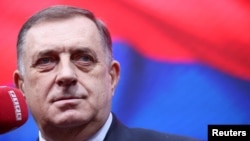
Bosnian Serb leader Milorad Dodik announced on March 31 that he had arrived in Moscow after prosecutors in Bosnia-Herzegovina requested an international arrest warrant over accusations that he flouted the Balkan country's constitution.
Dodik posted a video of himself on social media in front of the Tomb of the Unknown Soldier along the wall of the Kremlin.
"I start every time I stay here with a visit to the Tomb of the Unknown Soldier to pay my respects to the 28 million Russians who died in World War II," Dodik said in the video posted on X.
He provided no agenda for his visit but said he would "be here again on May 9 at the invitation of the president of the Russian Federation, Vladimir Putin, to mark the 80th anniversary of the victory over fascism."
Dodik, who is the president of Republika Srpska, is currently under US and U.K. sanctions for actions Western governments say are aimed at the secession of Republika Srpska from Bosnia.
The Court of Bosnia-Herzegovina on March 27 requested the international arrest warrant after Dodik failed to respond to a summons from the Prosecutor-General's Office on suspicion that he committed the criminal offense of attacking the constitutional order of Bosnia. The move came after the court issued a national arrest warrant on March 18.
Dodik spoke in the video of the suffering of Russians and Serbs in the defeat of fascism.
"Some are trying to revise history. It is impossible to do so, but those who want to do so are openly trying to distort historical facts," he said. "But the historical fact about the suffering of the Russian and Serbian people, and the Jewish people during World War II is simply impossible to change."
Dodik also spoke highly of Putin, with whom he has met several times since the beginning of the Russian invasion of Ukraine in February 2022 and who he said is "the historic leader of the Russian people."
He added Putin has welcomed "another counterpart who is important to him in the fight against the globalist elite, and that is [US] President [Donald] Trump."
The Bosnian court requested the international arrest warrant for Dodik and for Nenad Stevandic, speaker of the Republika Srpska Parliament, on suspicion of the same crime, attacking the constitutional order of Bosnia.
Dodik announced his arrival in Moscow on March 29 but did not provide details. The day before, he gave a statement to Radio Television of the Republika Srpska (RTRS) regarding flooding in Republika Srpska. It was not clear from the video where he was.
Republika Srpska in mid-March adopted a draft of a new constitution that would redefine the Serb entity as a state of the Serbian people, grant it the right to self-determination, and establish its own army.
These provisions would be directly in conflict with the Bosnian Constitution and the Dayton peace accords, which established Republika Srpska as one of Bosnia's two entities.
Throughout his tenure as president of Republika Srpska, Dodik has faced criticism for authoritarian tendencies, undermining democratic institutions, and fostering a culture of political patronage.
Supporters argue that he has brought stability and development to the entity, while opponents charge that his leadership has deepened divisions among the country's ethnic communities and eroded the state's institutional integrity.
With reporting by AFP
- By RFE/RL
French Far-Right Leader Le Pen Convicted Of Graft, Banned From Running For Office
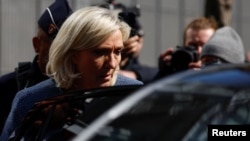
A French court has found far-right leader Marine Le Pen guilty in an embezzlement case and banned her from running for office for five years, a ruling that may keep her from participating in the 2027 presidential race in which she is currently the front-runner.
The court on March 31 also sentenced Le Pen, a member of the National Rally party (RN), to a four-year prison sentence, with two of those years to be spent under house arrest and two years suspended.
Eight other current or former RN members -- who, like Le Pen, previously served as European Union parliament members -- as well as 12 assistants for Le Pen and her party were also found guilty of syphoning off EU funds for the benefit of RN, which Le Pen led from 2011 to 2021.
The defendants were not accused of pocketing the funds but rather of illegally using the money intended for EU parliamentary aides to pay RN staff who worked for the party between 2004 and 2016.
"The investigations also showed that these were not administrative errors...but embezzlement within the framework of a system put in place to reduce the party's costs," Judge Benedicte de Perthuis said in his ruling.
Le Pen, 56, and her co-defendants deny wrongdoing and can appeal the ruling. Her ban on running for office, however, is effective immediately and can only be removed if her appeal is successful.
Le Pen, who was runner-up to President Emmanuel Macron in the 2017 and 2022 elections, is one of the most prominent figures of the European far right and a front-runner in polls for France's 2027 contest. She had said 2027 would be her final run for top office.
During the trial, Le Pen said the prosecutors were seeking her "political death." She left the court hearing before the sentence was announced.
US President Donald Trump called the conviction and prohibition from running in the 2027 a "very big deal."
Trump and LePen have drawn comparisons over their views on immigration and charged rhetoric against minorities.
"I know all about it, and a lot of people thought she wasn't going to be convicted of anything," Trump said.
"But she was banned for running for five years, and she's the leading candidate. That sounds like this country, that sounds very much like this country," Trump said in an apparent reference to legal cases that Trump faced before he took office.
With reporting by Reuters
- By RFE/RL
Three US Soldiers Found Dead In Vehicle Recovered From Lithuanian Bog As Search Continues
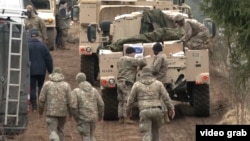
The US Army said the bodies of three American soldiers have been found in a military vehicle that was submerged in a bog in Lithuania after it went missing during a training exercise several days ago.
"The soldiers, whose identities are being withheld pending notification of next of kin, went missing in the early morning hours of March 25 in their M88A2 Hercules armored recovery vehicle while conducting a mission to repair and tow an immobilized tactical vehicle," US Army Europe and Africa said in a statement.
The armored vehicle was retrieved earlier on March 31, six days after a rescue operation was launched at the Pabrade military training ground near Lithuania's border with Belarus.
Lithuanian President Gitanas Nauseda said the search continues for a fourth US soldier who was part of the group.
US Army Europe and Africa said the soldiers were deployed to Lithuania in support of Operation Atlantic Resolve, and were permanently stationed at Fort Stewart, Georgia.
"...the search isn’t finished until everyone is home. Words cannot express our gratitude to those still working around the clock during these extensive search and recovery efforts and your unwavering commitment not to rest until all are found,” Major General Christopher Norrie said.
The missing vehicle and troops triggered a massive recovery effort involving hundreds of Lithuanian, Polish, and US personnel and dozens of vehicles.
Lithuania, a NATO and EU member, hosts more than 1,000 US troops stationed in the Baltic nation on a rotational basis.
In the early hours of the rescue operation, several conflicting accounts emerged, including comments from NATO Secretary-General Mark Rutte that the soldiers were dead.
A NATO spokeswoman later walked back those comments.
U.S. Army and Lithuanian authorities are investigating the cause of the accident.
Iran Vows Strong Response After 'Bombing' Threat By Trump
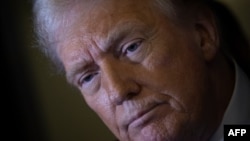
Iranian Supreme Leader Ayatollah Ali Khamenei warned of a "strong" response following a threat by US President Donald Trump that "there will be bombing" if Tehran doesn't agree to talks on its nuclear program as concern grows over escalating rhetoric between the two countries.
Speaking after Trump reiterated his threat of adopting measures ranging from fresh sanctions and tariffs to military action, Khamenei said in a sermon marking Eid Al-Fitr on March 31 that any attack by the United States would "surely receive a strong reciprocal blow."
The Iranian leader, however, added that he did "not really expect mischief from abroad."
The comment suggests Khamenei does not expect an attack but rather sabotage operations like explosions and assassinations, said Damon Golriz, a lecturer at The Hague University of Applied Sciences.
"He's effectively pointing the finger at Israel here," Golriz told Radio Farda, adding that Trump's remark on Iran and US officials talking was "important."
Switzerland's ambassador to Iran, who represents US interests and acts as an intermediary between Washington and Tehran, was summoned on March 31 by Iran's Foreign Ministry to express the regime's determination to respond "decisively and immediately" to any US threat.
Since Trump returned to the White House, his administration has consistently said Iran must be prevented from acquiring nuclear weapons and has previously warned that military action is on the table should Iran reject Trump's outreach.
Iran has long maintained that its program is for peaceful use, but Iranian officials have also threatened to pursue a weapon as tensions amid a growing standoff with the United States over sanctions and renewed bombing in the Gaza Strip following the collapse of a cease-fire in Israel's war against Iran-backed Hamas, which is deemed a terrorist organization by the United States and the EU.
Trump again threatened Iran in an interview with NBC News on March 30 just days after Tehran rejected holding direct talks with Washington over its rapidly expanding nuclear program.
While high-ranking Iranian officials had previously spoken against the idea of holding nuclear talks with the United States, Iranian President Masoud Pezeshkian said specifically on March 30 that Tehran would not enter direct negotiations with Washington, though it is willing to continue talks indirectly in line with an injunction from Khamenei.
"If they don't make a deal, there will be bombing," Trump said in the NBC interview by phone.
"There's a chance that if they don't make a deal, that I will do secondary tariffs on them like I did four years ago," he added.
But Trump also said US and Iranian officials are "talking," without offering details.
Mohammed Ghaedi, a lecturer at George Washington University's department of political science, told Radio Farda that Trump was "saber-rattling" and "exercising brinksmanship."
"I think it highly unlikely that Trump will bomb Iran, not least because he vowed on the presidential campaign trail not to drag the United States into a war," he told Radio Farda.
The latest trading of threats was preceded by a round of diplomacy that failed to bring the sides any closer.
An Emirati delegation delivered a letter to Tehran from Trump proposing nuclear talks with the United States earlier this month, but hours before it arrived Khamenei had already dismissed the prospect of talks with the Trump administration.
The letter gave Tehran a two-month window to decide on holding talks.
Similar comments were made by Iranian Foreign Minister Abbas Araqchi on March 27 when he said Tehran had sent a formal written response to Trump via Oman that maintained Iran will not hold direct negotiations as long as Trump's "maximum pressure" campaign is in effect.
A report in February by the UN's nuclear watchdog said Iran has accelerated its production of near weapons-grade uranium.
Iran's economy has been reeling from years of sanctions, particularly after Trump in his first term pulled the United States out of a landmark nuclear deal with Iran and reimposed sanctions.
Tehran is looking to find ways to ease those sanctions or have them removed entirely, but the public rejection of Trump's letter could lead to new pressure from Washington and other powers who are worried about Iran's nuclear program.
With the 2015 nuclear deal set to formally expire in October 2025, world powers that are still part of the pact have just a few months before they lose the ability to reimpose UN sanctions on Iran.
With reporting by RFE/RL's Kian Sharifi, AP, Reuters, and AFP
Trump Threatens Putin With Oil Tariffs, Pressures Zelenskyy On Minerals Deal
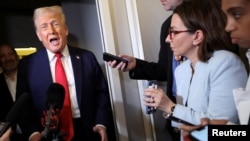
US President Donald Trump threatened Russia with new tariffs on oil products if Moscow blocks his cease-fire initiatives, while he also said Ukrainian leader Volodymyr Zelenskyy faces "big, big problems" if he doesn't sign a key minerals deal with Washington.
"He's trying to back out of the rare earth deal, and if he does that he's got some problems, big, big problems," Trump told reporters on March 30 in reference to the Ukrainian president.
"We made a deal on rare earth. And now he's saying, well you know, I want to renegotiate the deal."
"He wants to be a member of NATO, but he's never going to be a member of NATO. He understands that," Trump added.
On March 28, the Ukrainian government said it was still considering a draft agreement from the United States on the country's rare earth minerals amid media reports Washington had changed the terms of the deal several times.
Ukrainian Economy Minister Yulia Svyrydenko announced at a government meeting that Kyiv was forming its position on the agreement, but lawmakers would only state their stance once there was consensus. Before then, she said, public discussion would be harmful.
Ukraine possesses significant deposits of critical minerals, including rare earths, although their exact size remains uncertain. Rare earth minerals are highly valued for their use in defense technologies, as well as in devices such as computers, smartphones, and batteries.
Ukraine and the United States earlier this month agreed to conclude a comprehensive agreement for developing Ukraine's critical mineral resources. Efforts to seal the deal had earlier fallen apart on February 28 after a heated exchange between Trump and Zelenskyy at the White House.
Meanwhile, earlier on March 30, Trump said he would impose secondary tariffs of 25-50 percent on all Russian oil if he feels President Vladimir Putin is blocking his efforts to end the war in Ukraine.
During a phone interview with NBC news, Trump said he was "very angry" and "pissed off" when Putin called for a transitional government to be put in place in Ukraine, which could effectively push out Zelenskyy.
"If Russia and I are unable to make a deal on stopping the bloodshed in Ukraine, and if I think it was Russia's fault -- which it might not be -- but if I think it was Russia's fault, I am going to put secondary tariffs on oil, on all oil coming out of Russia," Trump said.
"That would be that if you buy oil from Russia, you can't do business in the United States," Trump said. "There will be a 25 percent tariff on all oil, a 25- to 50-point tariff on all oil."
Trump added that the trade measures would be put in place within a month if no cease-fire agreement is reached.
The highly sensitive diplomatic juncture comes after the White House announced on March 25 that both Russia and Ukraine agreed to a cease-fire and to allow navigation in Black Sea, as well an agreement to not strike each other energy facilities.
Kyiv says that it would take effect immediately and Moscow has stated that it would follow the partial lifting of sanctions pertaining to Russian companies and banks involved in the international food trade.
Tougher Tone Toward Putin
The comments by Trump mark a shift from the softer approach the White House had taken toward Russia since the US president made ending the war in Ukraine a top foreign policy priority. They also come after he had previously criticized Zelenskyy, saying he was "sick" of his handling of the war and called him a "dictator without elections."
Trump told NBC that he will speak with Putin during this week.
Meanwhile, in his nightly video address on March 30, Zelenskyy said "Russia's response to the American proposition of unconditional cease-fire are drones, bombs, artillery shelling, ballistic missiles on a daily basis. Putin is demonstrating that he doesn't give a damn about diplomacy."
"What is needed are tougher sanctions against Russia, more air-defense capabilities for Ukraine, and more unity among our partners," Zelenskyy added.
Amid the US-led diplomatic efforts to reach a cease-fire deal, Kyiv accused Moscow of a "war crime" on March 30 after Russian drones struck a military hospital.
The overnight strike hit Kharkiv, Ukraine's second-largest city, as part of an attack that also hit a shopping center, apartment blocks, and other targets, killing at least two people according to authorities.
The Ukrainian military's general staff accused Russia of "violating the norms of international humanitarian law" in the attack, which they denounced as "deliberate, targeted shelling." They added on March 30 that casualties included soldiers undergoing treatment in the medical center.
An hour before the Kharkiv attack, Zelenskyy said Kyiv expected a strong response from Western countries to the near daily Russian drone attacks on its territory.
"Our partners should clearly understand: These strikes are not just attacks on Ukrainian civilians, but also on all international efforts -- on the very diplomacy we are trying to use to end this war," Zelenskyy said on March 29.
In addition to the attacks on Kharkiv, Ukrainian authorities said that Russia fired a ballistic missile and launched drones as part of a barrage that also hit the cities of Dnipro, Kryviy Rih, and Poltava.
In total, Ukrainian authorities said that the overnight attacks killed at least two people and injured 26 others across the country.
The Ukrainian president added that "for too long," a US proposal for an unconditional cease-fire has been on the table "without a proper response from Russia. That says a lot."
With reporting by Reuters
- By RFE/RL
Myanmar Earthquake Death Toll Tops 1,700 As Fears Mount Of Rising Casualties
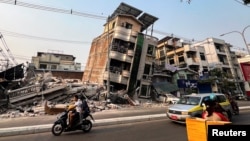
The death toll from the powerful earthquake that struck Myanmar on March 28 has risen to over 1,700, with fears that the number could soar in the coming days.
The 7.7-magnitude quake -- one of the strongest the war-torn country has experienced in a century -- also shook neighboring Thailand, causing damage and fatalities there.
The quake in Myanmar left around 1,700 dead, 3,400 injured, and more than 300 missing as of March 30, the Southeast Asian country’s military government said.
International aid agencies also warn of an expanding humanitarian crisis in the earthquake's aftermath.
"The destruction has been extensive, and humanitarian needs are growing by the hour," the International Federation of Red Cross and Red Crescent Societies said in a statement, warning that there was “an urgent need to stabilize” the situation ahead of the monsoon season before secondary crises emerge.
Rescue workers in Myanmar are continuing to search for possible survivors in the rubble of collapsed buildings, and the country’s military leadership has declared a state of emergency across six regions and allowed hundreds of foreign rescue personnel into the country to assist with the quake’s devastating aftermath.
The junta chief, General Min Aung Hlaing, warned that the number of fatalities could go up and his administration faced a challenging situation, state media reported, days after he made a rare call for international assistance.
India, China, and Thailand are among Myanmar's neighbors that have sent relief materials and teams, along with aid and personnel from Malaysia, Singapore, and Russia.
Myanmar’s military government is locked in a fight with insurgents, a situation that could hamper the rescue and relief operation.
The opposition National Unity Government said that anti-junta fighters under its command would pause all offensive military actions for two weeks as of March 30.
Critical Infrastructure Severely Damaged
Across the country of 55 million, critical infrastructure -- including bridges, highways, airports, and railways -- has been severely damaged, hampering humanitarian operations.
The quake comes on top of an already dire situation in a county wracked by a conflict that has battered the economy, displaced over 3.5 million people ,and debilitated the health system.
In some areas near the epicenter in central Myanmar, residents told Reuters that government assistance was scarce, leaving people to fend for themselves.
The U.S. Geological Service's predictive modelling estimated Myanmar's death toll could top 10,000 and losses could exceed the country's annual economic output, Reuters reported.
Hospitals in parts of central and northwestern Myanmar, including the second-biggest city, Mandalay, and the capital Naypyitaw, were struggling to cope with an influx of injured people, the UN Office for the Coordination of Humanitarian Affairs (OCHA) said late on March 29.
The quake also shook parts of neighboring Thailand, triggering the collapse of an under-construction skyscraper in Bangkok and killing at least 18 people across the capital, according to local authorities.
As of March 30, at least 76 people remained trapped beneath the rubble of the collapsed building, where rescue operations continued for a third day on March 30, using drones and sniffer dogs to hunt for survivors.
With reporting by Reuters
Iran's President Publicly Rejects Trump's Letter Calling For Nuclear Negotiations
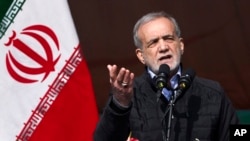
Iranian President Masud Pezeshkian publicly rejected holding direct negotiations with Washington over its rapidly expanding nuclear program, which had been proposed in a letter from US President Donald Trump and delivered to Tehran earlier this month.
“Although the possibility of direct negotiations between the two sides has been rejected in this response, it has been emphasized that the path for indirect negotiations remains open,” Pezeshkian said in televised remarks on March 30, referring to Trump’s letter.
While high-ranking Iranian officials had previously spoken against the idea of holding nuclear talks with the United States, Pezeshkian’s comments mark Iran’s first formal rejection of the US call for negotiations.
Since Trump returned to the White House, his administration has consistently said that Iran must be prevented from acquiring nuclear weapons and they have previously warned that military action is on the table should Iran reject Trump’s outreach.
Pezeshkian’s remarks now help set the stage for a further rise in tensions between Tehran and Washington over the country’s nuclear program.
Iran has long maintained that its program is for peaceful use, but Iranian officials have also threatened to pursue a weapon as tensions amid a growing standoff with the United States over sanctions and renewed bombing in the Gaza Strip following the collapse of a cease-fire in Israel’s war against Iran-backed Hamas, which is deemed a terrorist organization by the United States and the EU.
A report in February by the UN’s nuclear watchdog said that Iran has accelerated its production of near weapons-grade uranium.
An Emirati delegation delivered a letter to Tehran from Trump proposing nuclear talks with the United States earlier this month, but hours before it arrived Iranian Supreme Leader Ayatollah Ali Khamenei had already dismissed the prospect of talks with the Trump administration.
Similar comments were made by Iranian Foreign Minister Abbas Araqchi on March 27 when he said that Tehran had sent a formal written response to Trump via Oman which maintained that Iran will not hold direct negotiations as long as Trump’s “maximum pressure” campaign is in effect.
“This official response includes a letter in which our position regarding the current situation and Mr. Trump's letter has been fully explained to the other party,” Araqchi said.
In his televised comments, Pezeshkian offered the most direct acknowledgement yet that Tehran has rejected direct talks, although he left the door open for indirect negotiations with the United States and trust-building efforts.
“We don’t avoid talks; it’s the breach of promises that has caused issues for us so far,” Pezeshkian said. “They must prove that they can build trust,” he said, referring to the United States.
Iran’s economy has been reeling from years of sanctions, particularly after Trump, in his first term, pulled the United States out of a landmark nuclear deal with Iran and reimposed sanctions.
Tehran is looking to find ways to ease those sanctions or have them removed entirely, but the public rejection of Trump’s letter could lead to new pressure from Washington and other powers who are worried about Iran's nuclear program.
More sanctions could also be coming if Tehran doesn't reach an agreement.
With the 2015 nuclear deal set to formally expire in October 2025, world powers that are still part of the pact have only have a few months before they lose the ability to reimpose UN sanctions on Iran.
With reporting by the Associated Press
Trump Threatens Putin With Oil Tariffs If Unable To Reach Ukraine Cease-Fire
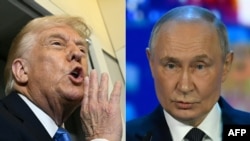
US President Donald Trump said that he will impose secondary tariffs of 25 percent to 50 percent on all Russian oil if he feels Moscow is blocking his efforts to end the war in Ukraine.
During a March 30 phone interview with NBC news, US President Donald Trump said that he was “very angry” and “pissed off” when Russian President Vladimir Putin called for a transitional government to be put in place in Ukraine, which could effectively push out Ukrainian President Volodymyr Zelenskyy.
“If Russia and I are unable to make a deal on stopping the bloodshed in Ukraine, and if I think it was Russia’s fault -- which it might not be -- but if I think it was Russia’s fault, I am going to put secondary tariffs on oil, on all oil coming out of Russia,” Trump said.
“That would be that if you buy oil from Russia, you can’t do business in the United States,” Trump said. “There will be a 25 percent tariff on all oil, a 25- to 50-point tariff on all oil.”
Trump added that the trade measures would be put in place within a month if no cease-fire agreement is reached.
The highly sensitive diplomatic juncture comes after the White House announced on March 25 that both Russia and Ukraine agreed to a cease-fire and to allow navigation in Black Sea, as well an agreement to not strike each other energy facilities.
Issues persist with implementing the deal.
Kyiv says that it would take effect immediately and Moscow has stated that it would follow the partial lifting of sanctions pertaining to Russian companies and banks involved in the international food trade.
The comments by Trump mark a shift from the softer approach the White House had taken toward Russia since the US president made ending the war in Ukraine a top foreign policy priority. They also come after he had previously criticized Zelenskyy, saying he was “sick” of his handling of the war and called him a "dictator without elections."
Trump told NBC that he will speak with Putin during this week.
Meanwhile, in his nightly video address on March 30, Zelenskyy said that "Russia's response to the American proposition of unconditional cease-fire are drones, bombs, artillery shelling, ballistic missiles on a daily basis; Putin is demonstrating that he doesn't give a damn about diplomacy."
"What is needed are tougher sanctions against Russia, more air-defense capabilities for Ukraine, and more unity among our partners," Zelenskyy added.
Attacks Continue Amid Ukraine Diplomacy
Amid the US-led diplomatic efforts to reach a cease-fire deal, Kyiv accused Moscow of a "war crime" on March 30 after Russian drones struck a military hospital.
The overnight strike hit Kharkiv, Ukraine's second-largest city, as part of an attack that also hit a shopping center, apartment blocks, and other targets, killing at least two people according to authorities.
The Ukrainian military’s general staff accused Russia of “violating the norms of international humanitarian law” in the attack, which they denounced as “deliberate, targeted shelling." They added on March 30 that casualties included servicemen undergoing treatment in the medical center.
An hour before the Kharkiv attack, Zelenskyy said that Kyiv expected a strong response from Western countries to the near daily Russian drone attacks on its territory.
“Our partners should clearly understand: These strikes are not just attacks on Ukrainian civilians, but also on all international efforts -- on the very diplomacy we are trying to use to end this war," Zelenskyy said on March 29 in his previous video address.
In addition to the attacks on Kharkiv, Ukrainian authorities said that Russia fired a ballistic missile and launched drones as part of a barrage that also hit the cities of Dnipro, Kryviy Rih, and Poltava.
In total, Ukrainian authorities said that the overnight attacks killed at least two people and injured 26 others across the country.
Zelenskyy’s remarks came after a 24-period of intensifying deadly strikes by Russian forces.
The Ukrainian president added that “for too long,” a US proposal for an unconditional cease-fire has been on the table “without a proper response from Russia. That says a lot.”
“Russia is striking at the positions of everyone who wants to end this war. It is impossible to ignore hundreds of Shaheds every night,” he added, referring to Iranian-made drones.
Earlier, a regional governor said a Russian drone attack on the southeastern Ukrainian city of Dnipro late on March 28 killed four people and sparked a large fire in a hotel and restaurant complex as well as at multiple private homes.
Russian forces used more than 20 drones in the strike on Dnipro, which also injured 25. Zelenskyy said a pregnant woman was among the injured.
Pictures and videos posted on social media showed flames and large plumes of smoke in the air. Others showed shattered buildings, the badly damaged upper floors of a high-rise apartment block, and streets strewn with smashed glass and pieces of buildings.
Elsewhere on March 29, at least seven people were injured in a missile strike on Kryviy Rih, Ukraine’s state emergency service said.
- By RFE/RL
American Woman Freed By Taliban, Second Release Of US Hostage In 8 Days
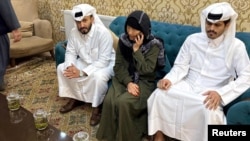
An American woman has been released by the Taliban rulers in Afghanistan after being detained since February, the second freeing of a US citizen in the past eight days.
In a video posted by US President Donald Trump on March 29, Faye Hall said she had been released by the Taliban after being detained in the war-torn country last month.
"I've never been so proud to be an American citizen," Hall said in the video. "Thank you, Mr President…God bless you."
Trump thanked Hall for the comments and added: "So honored with your words!"
Former U.S. Special Representative to Afghanistan Zalmay Khalilzad first announced the release hours earlier on X, saying it had occurred on March 27. He said she was in the care of the Qatari delegation in Kabul.
"American citizen Faye Hall, just released by the Taliban, is now in the care of our friends, the Qataris in Kabul, and will soon be on her way home," said Khalilzad, who has been part of a US team seeking the release of hostages held by the Taliban.
The development came a week after George Glezmann, 66, was released from detention in Kabul following the first visit by a senior US official to Afghanistan since the Taliban seized power in the wake of the withdrawal of international troops in August 2021.
Hall had been detained in February while with a British couple in their 70s, Barbie and Peter Reynolds.
British media said the Reynolds had been operating school projects in Afghanistan for 18 years and had remained in the country despite the Taliban’s return to power.
Reuters quoted a US official as saying Adam Boehler, Washington's special envoy for hostage affairs, had worked with Qatari officials and others to win Hall’s release.
There was no immediate information on the British couple. Their daughter has pleaded for their release, citing health concerns.
Several Americans are still detained in Afghanistan.
Upon his release, Glezmann also thanked Trump, Secretary of State Marco Rubio, and others who helped free him.
He told Fox News he was abducted in the streets of Kabul and thrown "into a dungeon with no windows no nothing."
Two other Americans held in Afghanistan were exchanged in late January for a Taliban man imprisoned for life in California on drug and terrorism charges.
Ryan Corbett and William McKenty were swapped for Khan Mohammed, who was sentenced to two life terms in 2008 and was incarcerated in a US prison.
Aid worker Corbett, 40, and Mahmood Habibi, 37 -- who led the Afghan Aviation Authority under the previous Afghan government -- were detained separately in August 2022.
The world community has not recognized the Taliban as the legitimate rulers of Afghanistan, although some countries -- including Russia, China, and Turkey -- still maintain embassies in Kabul.
Qatar has also maintained direct contact with the Taliban and has helped broker negotiations for the release of US hostages.
Amid poverty and unrest in the country, the Taliban rulers have made moves to open ties with the rest of the world. Western nations are reluctant to engage with the extremist group amid complaints of widespread human rights violations, especially against girls and women.
With reporting by RFE/RL's Radio Azadi, Reuters, AFP, and AP
- By RFE/RL
Amsterdam Stabbing Rampage Suspect Is From Ukraine, Police Say

Police in the Netherlands said on March 29 that a man suspected of a stabbing rampage that wounded five people in Amsterdam is a Ukrainian national from the eastern Donetsk region.
The 30-year-old man is suspected of using multiple knives to randomly stab five people in a busy shopping area in central Amsterdam on March 27 and is set to appear in court on April 1, police said in a statement.
The motive for the attack remains unclear, and the investigation remains ongoing, police said.
Ukrainian Foreign Ministry spokesman Heorhiy Tykhiy said Kyiv’s Embassy is “close contact with the law enforcement agencies of the Netherlands” and seeking additional information.
He added that the embassy is attempting to determine how the suspect arrived in the country and that it plans to work closely with Dutch authorities.
"We wish a speedy recovery to the victims. Such violence has no justification, and the perpetrator must be held accountable," Tykhiy added.
Two US citizens -- a 67-year-old woman and a 69-year-old man -- were among the victims of the attack, as were a 26-year-old man from Poland, a 73-year-old Belgian woman, and a 19-year-old woman from Amsterdam, police said.
They said the Polish man had been released from hospital, while the other victims remained hospitalized but in a stable condition.
Police said in the statement that the man checked into an Amsterdam hotel on March 26, the day before the attack. They did not release further details about his identity or arrival in the country.
A bystander wrestled the assailant to the ground during the attack and held him until police arrived.
Much of the Donetsk region, where Dutch police said the alleged assailant hails from, is occupied by Russia following the Kremlin’s armed incursion into eastern Ukraine in 2014 and the full-scale invasion of Ukraine that Russia launched in February 2022.
With reporting by Reuters and AP
- By RFE/RL
Myanmar Quake Death Toll Crosses 1,600, Scores Still Missing
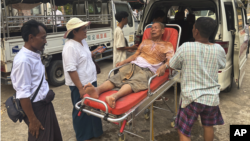
The death toll of a 7.7-magnitude earthquake in Myanmar has climbed to more than 1,600 amid fears that the casualty figures will continue to rise in the war-torn nation and in neighboring Thailand.
Myanmar’s military-run government said on March 29 that 1,644 people were killed in the earthquake that rocked the region a day earlier, while authorities in Thailand said at least 10 people have been found dead so far.
The toll of those injured rose to 3,408, while the number of those missing increased to 139.
Rescue workers in Myanmar on March 29 continued to search for possible survivors in the rubble of collapsed buildings, and the country’s military leadership allowed hundreds of foreign rescue personnel to enter to assist in the effort.
The country’s junta government declared a state of emergency across six regions and its isolated leader, General Min Aung Hlaing, said earlier on state television that he had invited "any country" to provide help and donations.
Myanmar’s military government is locked in a fight with anti-junta insurgents, a situation that could hamper the rescue and relief operation.
A spokesman for the opposition National Unity Government said earlier that fighters from the anti-junta militias known as the People's Defense Forces would provide humanitarian help.
Historic City At Epicenter
According to the US Geological Survey, the earthquake occurred at around 1:30 p.m. local time at a depth of 10 kilometers near Mandalay, the second-largest city in Myanmar. It was followed 11 minutes later by a 6.4-magnitude aftershock.
The tremors left buildings, bridges, and roads wrecked in the epicenter, Mandalay, an ancient city of about 1.5 million people, residents and local media said.
Reuters cited an unnamed resident as saying that destruction stretched across the entire city, leaving it with no electricity and disrupted phone lines.
Thailand’s capital, Bangkok -- located more than 600 miles from the epicenter -- was declared a disaster zone after the quake sent high-rise buildings swaying.
Thailand's deputy prime minister, Anutin Charnvirakul, said authorities had mobilized all possible resources in the search for survivors and to retrieve the remains of the deceased.
"We always have hope," Charnvirakul told reporters. "We're still working around the clock."
Thailand's state-owned operator of the country's airports said in a statement on March 29 that operations at six airports -- including in Bangkok and Phuket -- had returned to normal operations and safety inspections.
With reporting by AP, AFP, and Reuters
Civilians Killed In Pakistani Drone Strikes Targeting Militants
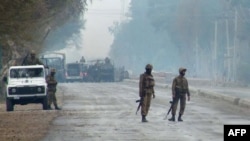
Multiple civilians, including women and children, were killed in a Pakistani military operation targeting militants in the northwestern Khyber Pakhtunkhwa province, a provincial official said.
Barrister Muhammad Ali Saif, a spokesperson for the Khyber Pakhtunkhwa government, said in a March 29 statement that nine members of a family were killed unintentionally in the operation the previous day in the mountainous Katlang area of the province’s Mardan district.
“Several wanted terrorists were successfully targeted during the operation,” Saif said, adding that civilians living nearby, including women and children, were also killed.
Local residents told RFE/RL’s Radio Mashaal that the victims, originally from Swat Valley, had been living in isolation in the Katlang area. They claimed the victims were killed as a result of military drone strikes on the family’s makeshift tent.
The incident sparked public outrage, with relatives and local residents staging a protest and temporarily blocking the Swat Motorway -- a major route leading to the Swat Valley -- to condemn the killing of civilians.
Mardan district police spokesperson Fahim Khan told Radio Mashaal that the bodies had been transferred to the district headquarters hospital for post-mortem examination, and that investigations into the incident are ongoing.
An unidentified police source was quoted by the AFP news agency as saying earlier on March 29 that the Pakistani military carried out three drone strikes targeting "Pakistani Taliban hideouts" in the region.
Violence On The Rise
The operation comes amid a rise in violent attacks in Pakistan’s strategic region bordering Afghanistan and Iran.
The extremist Tehrik-e Taliban Pakistan (TTP) and Islamic State-Khorasan groups are behind an escalating insurgency in Khyber Pakhtunkhwa Province.
Earlier on March 29, a Pakistani intelligence official told Radio Mashaal that at least seven soldiers and six suspected militants were killed during a separate military operation in the province.
The official, who spoke on condition of anonymity because he was not authorized to speak with the media, said five soldiers were also injured in the clash in the province’s Lakki Marut district and had been taken to a military hospital in the city of Bannu for treatment.
The official did not identify which militant group was involved in the clash, but AFP cited an unidentified police source as saying the operation targeted “armed Taliban” fighters.
Since the Taliban's return to power in Afghanistan following the US withdrawal in 2021, violence by both TTP militants and the Balochistan Liberation Army (BLA), a separatist militant group pursuing Balochistan's secession from Pakistan, has been on the rise.
BLA militants claimed responsibility for an unprecedented attack earlier this month with the hijacking of a passenger train with more than 400 people on board.
The Pakistani military previously claimed to have killed 11 suspected militants in four separate operations and clashes in North Waziristan and Dera Ismail Khan on March 26-27.
Radio Mashaal was unable to independently verify that claim.
Police in Khyber Pakhtunkhwa Province said in a report released on March 19 that, in the first 10 weeks of this year, there were a total of 68 attacks on police, in which a total of 26 soldiers were killed.
The Pakistani government says it is committed to fighting terrorism.
In a March 23 speech, Pakistani President Asif Ali Zardari said the nation and its security agencies are "united" against terrorism and will not allow militant groups to achieve their "unspeakable" goals.
Prime Minister Shehbaz Sharif, who chairs Pakistan's National Security Committee, said on March 18 that the government should respond to terrorism with "full force."
With reporting by AFP
Russian Drone Attack On Ukrainian City Of Dnipro Kills 4, Injures 25, Governor Says
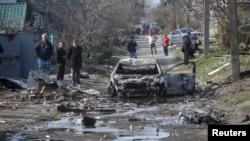
A Russian drone attack on the southeastern Ukrainian city of Dnipro late on March 28 killed four people and sparked a large fire in a hotel and restaurant complex as well as multiple private homes, the regional governor said.
"According to the information we have at the moment, there are four deaths in Dnipro," said Serhiy Lysak, governor of the Dnipropetrovsk region, on Telegram.
Russian forces used more than 20 drones in the strike on Dnipro, which also injured 25. Ukrainian President Volodymyr Zelenskyy said a pregnant woman was among the injured.
"Russia mocks the world’s peace efforts -- dragging out the war and committing these acts of terror because it still doesn’t feel real pressure," Zelenskyy said in his X post on March 29.
Lysak said a high-rise apartment building and nearly 10 private homes had caught fire. The blaze in the hotel complex has been brought under control, he said.
Pictures and videos posted on social media showed flames and large plumes of smoke in the air. Others showed shattered buildings, the badly damaged upper floors of a high-rise apartment block, and streets strewn with smashed glass and pieces of buildings.
Ukrainian Foreign Minister Andriy Sybiha called the attack "Putin’s response to US cease-fire proposals."
Elsewhere on March 29, at least seven people were injured in a missile strike on Kryviy Rih, Ukraine’s state emergency service said in a statement.
The attack also damaged residential buildings, a store, a car wash, and an infrastructure facility along with more than 20 cars.
Meanwhile, Ukraine’s armed forces on March 28 reported that a strike carried out the day before in the Bryansk region of Russia destroyed the military infrastructure of a checkpoint. The Ukrainian Air Force struck the Pogar border checkpoint in the locality of Sluchovsk in the Bryansk region, the General Staff of the Armed Forces said.
In addition to the military infrastructure, the strike destroyed the checkpoint’s means of communication and electronic warfare as well as a video surveillance system, according to the Ukrainian military. Casualties among personnel are preliminarily estimated at 15 to 40 Russian servicemen, the General Staff said.
It was not possible to verify the claims.
The General Staff called the air strike a response to the Russian Army’s continued drone attacks on Ukrainian settlements, which destroy civilian infrastructure and kill Ukrainian citizens.
"It is known that Russian [drone] launches have been repeatedly recorded from the Pogar location. The destruction of the specified checkpoint reduces the enemy's potential for conducting combat operations against units of the Defense Forces of Ukraine in the Sumy region and in the Kursk direction," the command said in a statement.
The Russian Defense Ministry did not report a strike on the Pogar checkpoint. The governor of the Bryansk region announced a strike on an agricultural enterprise in the area the day before.
Meanwhile, amid a series of US-led talks aimed at establishing a lasting truce between Kyiv and Moscow, US Vice President JD Vance said on March 28 that he sees "an incredible amount of progress" being made toward a peaceful resolution of the war in Ukraine.
"We make sure that what we're seeing from one party is met by the other party and vice versa [...] For the first time in four years, thanks to President Trump's leadership we have an opportunity to really achieve a peaceful settlement," Vance told reporters while visiting the US military base at Pituffik in Greenland.
With reporting by Reuters
- By Ray Furlong
RFE/RL Continues Lawsuit As It Awaits Funds; Judge Blocks Dismantling Of VOA
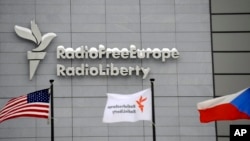
Radio Free Europe/Radio Liberty (RFE/RL) is continuing legal action against the US Agency for Global Media (USAGM) to secure the release of congressionally appropriated funding, it said in a statement on March 28.
USAGM oversees RFE/RL, Voice of America (VOA), and other US international media.
The USAGM claimed to terminate RFE/RL’s grant on March 15, hours after an executive order signed by US President Donald Trump called for the reduction of seven agencies -- including the USAGM -- to “the maximum extent consistent with applicable law.”
On March 26, USAGM wrote to RFE/RL saying that it was reversing the announcement but that this was “without prejudice to USAGM’s authority to terminate the grant.”
RFE/RL’s lawsuit maintains that USAGM does not have this authority, since the grant was awarded by an act of Congress.
A statement released by RFE/RL on March 27 said “RFE/RL awaits official confirmation from USAGM that grant funding will resume.”
The new statement on March 28 made it clear that this had not yet happened.
“We look forward to receiving the funds that Congress has appropriated to us through the US Agency for Global Media (USAGM). Until then, we will pursue all necessary legal remedies to ensure that Congressional intent is respected,” it said.
The statement also said RFE/RL’s commitment to its audiences and congressionally mandated mission "remains steadfast.”
On March 25, a US court granted RFE/RL’s request for a temporary restraining order (TRO), ruling that USAGM had acted “arbitrarily and capriciously” in terminating RFE/RL’s grant.
The grant's termination was communicated in a letter signed by Kari Lake, who listed her title as “Senior Advisor to the (USAGM) Acting CEO with Authorities Delegated by Acting CEO.”
After writing to RFE/RL on March 26, Lake continued to criticize RFE/RL and other USAGM entities.
“The question to the American people is do you want your hard-earned tax dollars going to this type of propaganda? I’m fighting it right now at the US Agency for Global Media and it’s going to be a battle,” she told Newsmax.
In a subsequent interview on One America News, Lake said that she had not yet had time to review the journalism of USAGM entities.
A federal judge in New York later on March 28 criticized USAGM's leadership, including Lake, for pulling the plug “seemingly overnight” on VOA and other news organizations run by the USAGM with “no consideration of the effects.”
Judge James Paul Oetken's comments came in an order blocking the Trump administration’s efforts to dismantle VOA, calling the move a “classic case of arbitrary and capricious decision making.”
Oetken faulted the Trump administration for “taking a sledgehammer to an agency that has been statutorily authorized and funded by Congress."
In a win for VOA, the judge issued a temporary restraining order barring the agency from “any further attempt to terminate, reduce-in-force, place on leave, or furlough” employees or contractors, and from closing any offices or requiring overseas employees to return to the United States.
“This is a decisive victory for press freedom and the First Amendment, and a sharp rebuke” to the Trump administration’s “utter disregard for the principles that define our democracy,” said Andrew G. Celli Jr., a lawyer for VOA.
Celli represents a coalition of VOA journalists, labor unions, and Reporters Without Borders that sued the Trump administration after Trump issued the executive order that cut funding to the USAGM and six other unrelated federal entities as part of his campaign to shrink government and align its with his political agenda.
According to the lawsuit, VOA employees were told to finish their live broadcasts on March 15 then vacate the building. Soon after, the lawsuit said, they lost access to agency computer systems, including e-mail. VOA news website hasn’t been updated since.
The plaintiffs argued that in the absence of VOA's programming “propagandists whose messages will monopolize global airwaves” is filling the vacuum.
Trump and other Republicans have accused VOA of having a “leftist bias” and failing to project “pro-American” values to its worldwide audience, even though it is mandated by Congress to serve as a nonpartisan news organization.
Lake, a former television journalist, has been especially harsh in her characterization of the content produced by VOA, RFE/RL, and the other news organizations.
“We want to make sure that these agencies are in line with what our American values are. We’re telling America’s story. We’re not telling our adversaries’ stories.”
“By God," she said, “we’re not going to be putting out anti-American garbage.”
Separately on March 28, Radio Free Asia (RFA), another of USAGM's stakeholders, said it would shut down by the end of April if the courts did not prevent the Trump administration from cutting its funding.
RFA has filed a motion to stop the USAGM's termination of funding and ensure access to funds appropriated by Congress.
"The filing emphasizes the irreparable harm being done to RFA’s operations, its reputation, and its ability to protect journalists reporting from some of the most dangerous parts of the world," it said in a statement.
"Without court intervention, RFA is expected to fully shut down by the end of April."
RFA said it has already furloughed 75 percent of its US-based staffed and suspended more than 90 percent of its freelance journalists.
The agency has broadcast across Asia since 1996. Rights activists say its multilingual reporters provide reliable news in authoritarian countries, raising awareness about the plight of oppressed minorities such as Uyghur Muslims in China.
With reporting by AP and Reuters
- By RFE/RL
More Than 1,000 Killed, Scores Missing After Powerful Quake Hits Myanmar, Thailand
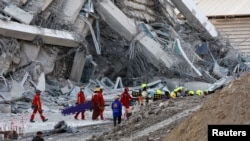
A strong 7.7-magnititude earthquake hit Southeast Asia on March 28, killing more than a thousand people in Myanmar and neighboring Thailand amid fears the casualty figures will continue to rise in both countries.
The death toll in Myanmar climbed to 1,002, the military government said on March 29. Fatalities have also been reported in neighboring Thailand, where the quake rattled buildings and brought down a skyscraper under construction in the capital Bangkok.
The Myanmar government has declared a state of emergency across six regions and the isolated country’s junta leader, General Min Aung Hlaing, made a rare request for international humanitarian aid.
He said on state television that he had opened routes for international assistance and invited "any country" to provide help and donations. Myanmar’s military government is locked in a fight with anti-junta insurgents, a situation that could hamper the rescue and relief operation.
A spokesman for the opposition National Unity Government said fighters from the anti-junta militias known as the People's Defense Forces would provide humanitarian help.
According to the US Geological Survey, the earthquake occurred around 1:30 p.m. local time at a depth of 10 kilometers near Mandalay, the second-largest city in Myanmar. It was followed 11 minutes later by a 6.4-magnitude aftershock.
The tremors left buildings, bridges, and roads wrecked in the epicenter, Mandalay, an ancient city of about 1.5 million people, residents and local media said.
Reuters cited an unnamed resident as saying that destruction stretched across the entire city, leaving it with no electricity and disrupted phone lines.
Thailand’s capital, Bangkok -- located more than 600 miles from the epicenter -- was declared a disaster zone after the quake sent high-rise buildings swaying. Authorities said at least 10 people have been found dead so far.
Rescuers were searching for at least 80 construction workers trapped under a unfinished 33-story building that has collapsed into rubble in Bangkok, according to Defense Minister Phumtham Wechayachai.
With reporting by AP and Reuters
Lithuanian President 'Hopes For Miracle' As Search For US Troops Continues
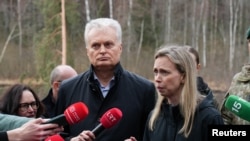
Lithuanian President Gitanas Nauseda said he still “hopes for a miracle” as rescue crews continue work to recover a submerged military vehicle that was carrying four US soldiers who remain missing.
Nauseda told reporters after he arrived on March 28 to survey the situation at the Pabrade military training ground near Lithuania's border with Belarus that while many sceptics "would probably say there is nothing to hope for in these circumstances, I want to believe."
"I am still hoping for a miracle," he added.
Rescue operations have been under way since the early hours of March 25, when four US soldiers in an M88 Hercules armored recovery vehicle went missing.
Their vehicle was found submerged in a bog out in the training ground, triggering a massive recovery effort involving hundreds of Lithuanian and US personnel and dozens of vehicles.
Lithuanian Defense Minister Davile Sakaliene said the rescue operation was able to remove "two to three meters of silt," but the vehicle was still not visible due to murky water.
"It's still not enough, and water is rushing into the incident site from a nearby lake," she told LRT radio earlier in the day. She previously said the vehicle was located in water and mud at “more than 5 meters down.”
Sakaliene said that the fate of the four soldiers has yet to be determined and that investigators have not ruled out the possibility that they are not in the vehicle, but elsewhere.
On March 27, US Ambassador to Lithuania Kara C. McDonald visited the site of the search operation, pledging that US authorities "will not rest until we find them."
Following the McDonald’s visit and the arrival of a team of US divers to the training ground, Sakalene said Lithuanians are “heartbroken” and “watching every moment of this rescue operation.”
“Just as America doesn’t leave its own behind, we in Lithuania don’t leave ours behind either. And we consider these American soldiers our own,” she told Fox News on March 28.
Lithuania, a NATO and EU member, hosts more than 1,000 US troops stationed in the Baltic nation on a rotational basis.
US Army Europe and Africa said in a statement earlier that the four soldiers were "conducting scheduled tactical training" when they went missing on March 25.
In the early hours of the rescue operation, several conflicting accounts emerged, including comments from NATO Secretary-General Mark Rutte that the four US soldiers were dead.
A NATO spokeswoman later walked back those comments.
Asked on the evening of March 26 by reporters if he had been briefed about the missing soldiers, US President Donald Trump said, “No, I haven’t.”
He has not commented on the situation since.
After New US Push, Ukraine Is Still Considering Minerals Deal

KYIV -- The Ukrainian government said it is still considering a draft agreement from the United States on the country's minerals amid media reports Washington has changed the terms of the deal several times.
Ukrainian Economy Minister Yulia Svyrydenko announced at a government meeting that Kyiv is forming its position on the agreement but lawmakers would only state their stance once there was consensus. Before then, she said, public discussion would be harmful.
As the United States has been engaging in shuttle diplomacy to bring peace to Ukraine, US President Donald Trump said on March 24 that he expected the two countries would soon sign a minerals and natural resources deal.
Speaking to Reuters, Mykhaylo Podolyak, a senior adviser to Ukrainian President Volodymyr Zelenskyy, said that the draft agreement had yet to be finalized.
The news agency said that, according to three people familiar with the talks, the latest draft gives Ukraine no future security guarantees and requires it to contribute all income from the use of natural resources managed by state and private enterprises to a joint investment fund.
"Consultations are still happening at the level of the various ministries," Podolyak said.
Ukraine possesses significant deposits of critical minerals, including rare earths, although their exact size remains uncertain. Rare earth minerals are highly valued for their use in defense technologies, as well as in devices such as computers, smartphones, and batteries.
Recouping US Support
Last month, Ukraine and the United States reached a comprehensive agreement to develop Ukraine's vital mineral resources. The agreement was part of Trump's efforts to end the war and recoup some of the tens of billions of dollars the US has given Ukraine in financial and military aid since Russia's full-scale invasion in 2022.
Following a contentious meeting between Trump and Zelenskyy at the White House on February 28, attempts to finalize the agreement collapsed.
At the heart of the original deal was a joint fund that would be financed by future profits from the extraction of valuable minerals in Ukraine.
It is not clear whether the terms of the minerals deal have changed or whether it will include the security guarantees for Ukraine that Zelenskyy has pushed for.
The Ukrainian president said on March 27 that the United States was "constantly" altering the terms of the proposed agreement, though he added that he did not want Washington to believe that Kyiv was opposed to it.
The London-based Financial Times reported on March 27 that the new draft agreement goes far beyond the first agreement and would cover all mineral resources, including oil and gas, and major energy assets across Ukraine.
In comments on X on March 28, Svyrydenko said that, given the importance of the agreement, "it is crucial for us to have a constructive dialogue with our American partners."
Editors' Picks
RFE/RL has been declared an "undesirable organization" by the Russian government.
If you are in Russia or the Russia-controlled parts of Ukraine and hold a Russian passport or are a stateless person residing permanently in Russia or the Russia-controlled parts of Ukraine, please note that you could face fines or imprisonment for sharing, liking, commenting on, or saving our content, or for contacting us.
To find out more, click here.




